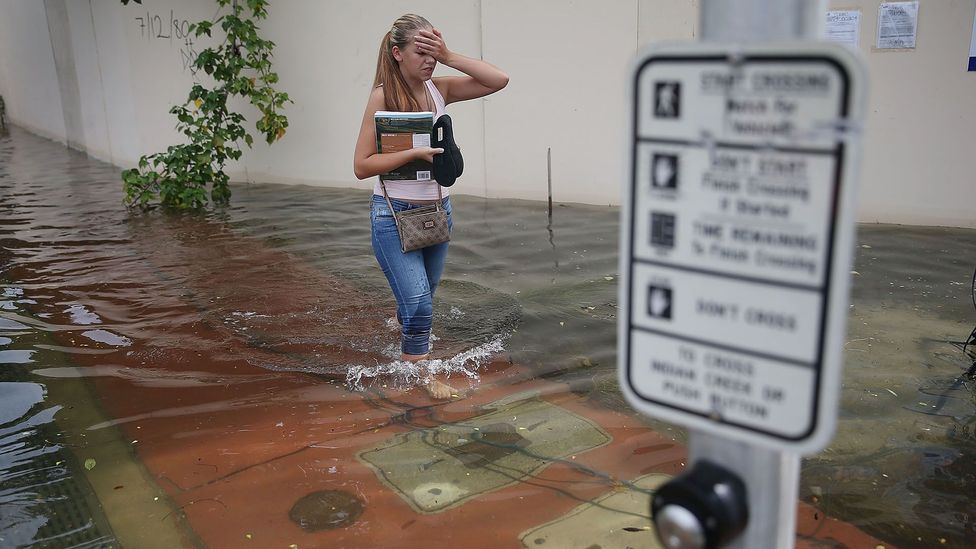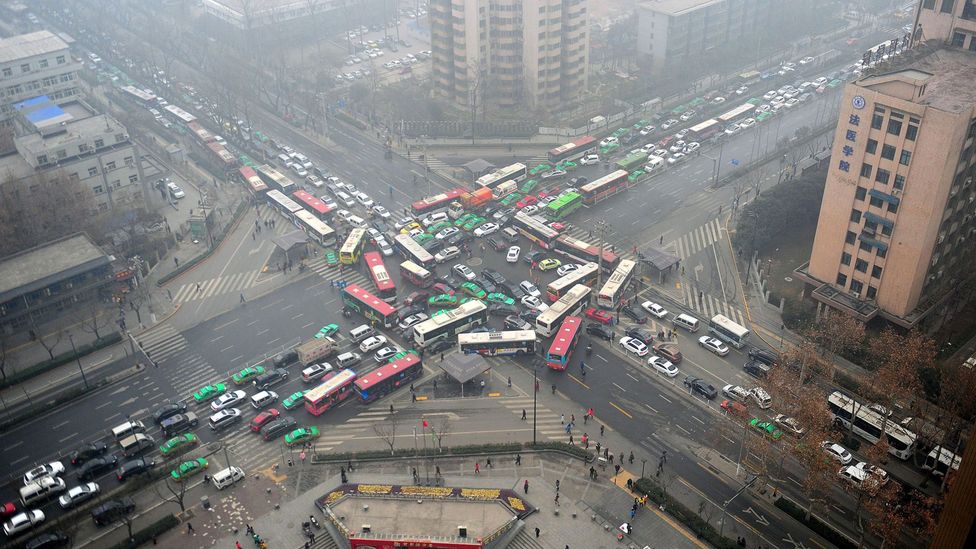On the Worlds Summit We Launch Once Again Our Insolent Challenge to the Stars!ã¢â‚¬â
10 m challenges we'll face past 2050

Editing genes, ageing populations, ascension sea levels… the world is moving faster than e'er. What volition those trends mean for our guild over the next 30 years?
Thou Challenges
In this special series, Hereafter Now takes a shut expect at the biggest, almost of import issues nosotros face up in the 21st Century.
For 2 months, nosotros'll bring you lot insight from leading scientists, technologists, entrepreneurs and influencers to help you make sense of the challenges we confront in today'southward speedily evolving world.
Over the concluding few months, BBC Futurity Now has been examining some of the biggest problems humankind faces right now: land use to accommodate exploding populations, the future of nuclear energy, the chasm betwixt rich and poor – and much more.
But what about the big challenges that are brewing for the future? In xxx years, what might exist on the world'due south agenda to solve? It's impossible to predict, just we can get clues from how current trends in scientific discipline and technology may play out. Here are just some of the potential large bug of tomorrow:
GENETIC MODIFICATION OF HUMANS
Debates among scientists started roaring last year over a new technology that lets u.s. edit human DNA. It'south chosen Crispr (pronounced 'crisper') and it's a means of altering people's DNA to carve diseases like cancer out of the equation.
Sounds great, right? But what if takes a dark ethical turn, and it turns into a eugenics-esque vanity projection to churn out 'designer babies', selecting embryos that produce babies that will take a sure amount of intelligence or that accept certain physical characteristics?
While it'southward nonetheless non widely used enough to be considered a electric current "thousand claiming", this is an up-and-coming advancement whose wide-ranging repercussions nosotros need to be prepared for – and it's all the more reason to ensure ethicists accept a seat at the table at every laboratory, university and corporation that might be itching to modify our Deoxyribonucleic acid.
"Proper reflection on what about us we might want to preserve takes time – information technology should depict on a broad range of perspectives about what it means to be human," Nicholas Agar, professor of ethics at the Victoria University of Wellington in New Zealand, told BBC Time to come Now earlier this year. "It's difficult to gear up aside this time for upstanding reflection when new technological possibilities seem to be coming thick and fast."
A MORE Anile POPULATION THAN EVER BEFORE
We won't just be wrestling with the fact that the world's population is exploding – but people are living longer than always, too. Which is great – but all those senior citizens are going to require care. In fact, the number of centenarians will increase more than l times – from 500,000 today to over 26 million by 2100. From the Uk to Japan to Mainland china, societies with large numbers of people over 65 volition become more mutual. In the next couple of decades, equally that increase starts to happen, we'll need better intendance for the elderly (Japan is even eyeing robots) and perchance policies to allow more immigrants to endeavor and make up for ageing workforces and in some cases, declining nascence rates.

Floods and rise sea levels are becoming more common in coastal regions like Florida as populations grapple with the furnishings of climate change (Credit: Getty Images)
LOST CITIES
You don't need to look very hard in a place like Miami to encounter how cities are changing in the 21st Century – ascension sea levels are gradually making some of them disappear. Fuelled by climate change, not only are floods condign more mutual in the streets, but the changing weather patterns accept likewise influenced building pattern. Bated from more seawalls, the city is requiring all new buildings exist built with their showtime flooring built college. Just that's all a sticking plaster – if current trends continue, we may accept to come up to terms with losing whole swathes of cities, islands and low-lying regions such as Bangladesh. The economic impact to regions will be profound, and climate refugees could become the norm.
Force per unit area is already growing on cities, as urban populations grow. If climate change forces mass migration, then existing infrastructure, services and economies may exist stretched to breaking signal.
THE Development OF SOCIAL MEDIA
Social media has complicated the way we communicate for the ameliorate part of a decade. And it'south not going anywhere anytime soon, given that almost people get their news from information technology now. That's before we even get into the mess of online harassment, as well. What might social media look like in 30 years, and by that fourth dimension, what are some threats it might pose?
A world with no privacy, for one. That's one problem nosotros're already seeing. And as well weathering away our sense of and desire for anonymity and privacy, social media brings with information technology the many problems of cyberbullying too. Many charities and not-profit organisations beyond the earth have mobilised in the fight against cyberspace trolls, simply it's an open up question about whether law enforcement agencies and the social media companies can set information technology or whether it volition get worse.
Then there's besides the problem of our information diet to consider: if the condition quo of ubiquitous fake news remains, how volition that shape how people come across the globe? If individuals spend months, years, fifty-fifty decades of their life exposed but to unreliable news sources, it does not augur well for civilised order and debate.
That said, given how fast social media has arrived in the globe, an optimist may suggest that those problems could soon be resolved. In 30 years' fourth dimension nosotros may be dealing with social media issues that we've not fifty-fifty considered withal. Afterward all, Facebook is only 13 years old.
NEW GEOPOLITICAL TENSIONS
The by year has seen a complete upset of our geopolitics' fragile balance. That could make the global stability of the adjacent couple of decades a complete question mark.
North Korean missile launches. Thousands of refugees crossing borders to flee turmoil. Hackers meddling in other nations' elections. Ascent nationalist sentiment worldwide. Headlines in 2016 (and then far, 2017) have been dominated by never-catastrophe political drama that'southward been fuelling a 'geopolitical minefield' and an 'unprecedented geopolitical shift' – whether information technology's managing unpredictable Due north Korea, the plight of Syrian refugees, or Britain'southward transition from the European Union. Throw in widespread hacking, nuclear missiles and other dangerous applied science, and it's easy to see why maintaining basic diplomacy becomes vital.
Prophylactic CAR TRAVEL
Despite all the rapid urbanisation and talk of bullet trains and fantastical engineering science similar the Hyperloop coming to the fore, the car isn't going anywhere – and in fact, in the next couple decades, there volition be even more of them on the road.
Driverless auto technology is swiftly rolling out, with major tech companies and automakers aggressively seeking to debut human-free vehicles in coming years. Simply in add-on, the sheer number of cars – self-driving or non – is going to skyrocket, studies show. In countries like Communist china that are seeing a growing centre form, the environmental and infrastructural needs that an increasingly road-faring population demands is going to be a grand claiming. How do we ensure condom, fight pollution, and make sure driverless cars aren't a menace on the road?

Speedily industralising countries similar China are seeing every bit rapid increases in machine ownership(Credit: Getty Images)
DWINDLING RESOURCES
The new tech and devices that characterise the 21st Century all crave rare earth metals to brand – an average smartphone has over sixty "ingredients". That'due south putting a strain on the planet's natural resources: in Red china, where 90% of the world'southward rare earth metals are plant, it's estimated that its mines will run out in the side by side two decades – and skilful substitutes for those materials are hard to come up past.
SETTLING OTHER WORLDS
How will space tourism companies make certain their activities are condom? How volition nosotros observe ways to send humans to Mars or another planet to live there, as Stephen Hawking has urged united states of america to figure out? Space travel might seem like the domain of space agencies and billionaires today, but as it becomes more attainable to everybody else, a whole host of new challenges will sally. Outer space is increasingly looking less similar the final borderland and more similar our lawn, and with more coin being shelled out to become humans up to the inky abyss than ever before, the logistics, safety and affairs backside the challenge all demand serious consideration.
Additional BRAINPOWER
It's already common to use drugs to boost brainpower (whether it's coffee, or something stronger, like modafinil), and nigh of the adult world now relies on their smartphones as an 'externalised' retention – merely allow'due south extrapolate that out a few decades. Imagine targeted pharmaceuticals that make us think faster than currently possible, and technological implants that help us concentrate across normal human power for hours or days, for example – these advances are already well underway in laboratories around the world. The question it raises is: what happens to those that cannot afford such enhancements? Could information technology widen inequality, and allow the rich to go richer? Then there's also the legal and ethical problems: it'due south acceptable to drink a java earlier you sit down an test, just is it ok to employ an implant or a smart drug? The challenges posed by intelligence enhancement are merely just emerging.
AI'Southward DOMINANCE IN OUR LIVES
Futurist Ray Kurzweil has made a host of predictions – some inspirational, others downright alarming. Ane of them is the sci-fi-sounding notion that suggests artificial intelligence will 1 day become more powerful than human intelligence and meliorate itself at an exponential rate, otherwise known every bit 'the singularity'.
It's far from the bulk view, but few would deny that AI is only going to get more powerful. Then, like in the case of gene editing, the tech and AI community will need to consider the upstanding and societal implications of their work as AI comes to shape more than realms of our life, from healthcare to financial markets.
Equally for finish-of-the-world extinction scenarios, it's bluntly not likely – merely that shouldn't obscure the fact that AI is poised to alter how we live and piece of work in profound ways. It is too non impossible that specific AIs could malfunction or run out of their creators' control, leading to very human disasters, where lives are lost or millions of dollars are wiped out.
--
That's only a taster of what we may face up in 2050. What challenges do you lot think are in store for the homo race? Permit united states know onFacebook, or Twitter.
+ Read more from our Grand Challenges series:
Is the 'terminate of modern medicine' well-nigh?
Are we running out of land?
How automation will bear upon you
Garry Kasparov: The upsides of AI
How slow internet affects income
Why 'hydro-politics' will shape the 21st Century
fifty grand challenges for the 21st Century
There'southward a trouble with the way we define inequality
Bryan Lufkin is the editor of Future At present for BBC Time to come. Follow him on Twitter at @bryan_lufkin.
Source: https://www.bbc.com/future/article/20170713-what-will-the-challenges-of-2050-be
0 Response to "On the Worlds Summit We Launch Once Again Our Insolent Challenge to the Stars!ã¢â‚¬â"
Postar um comentário